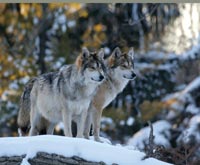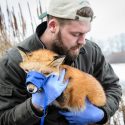Key lesson from the first hunt: Harvesting wolves may be easier than anticipated
One of the early lessons from Wisconsin’s first wolf hunt in decades is that shooting or trapping wolves is easier than wildlife management experts had expected, says Tim Van Deelen, University of Wisconsin–Madison professor of forest and wildlife ecology.

UW-Madison researcher Tim Van Deelen says the state’s first wolf hunt proves that shooting or trapping wolves is easier than officials expected.
That’s indicated by the fact that hunters and trappers had taken nearly 100 wolves out of a quota of 116 by the week after Thanksgiving—five weeks into a 20-week season—even though they were barred from using dogs, he says.
Van Deelen discusses this year’s deer and wolf hunting seasons in a podcast produced by the UW–Madison College of Agricultural and Life Sciences and UW-Extension. The podcast is available here.
“The first (hunt) out of the box is important for learning how the system behaves,” he says. “How successful hunters can be is really important information for designing a quota system—how many permits do you allow if you want to have a harvest of a certain size. We’re just getting our feet wet with that.”
While he doesn’t expect this year’s fairly modest harvest to have a big impact on the state’s wolf population, the longer-term impact of an annual wolf hunt is unknown, says VanDeelen. That’s because the state has yet to establish long-term management goals and priorities.
“You can have a sustainable wolf hunt at an almost infinite number of levels if you define sustainability as the wolf population remaining the same size from year to year,” he says. “The problem really is what do you expect from your wolf population. What do you want it to be. Do you want it to be just a relic population, like a museum piece? Or do you really want wolves to have some sort of role in those northern ecosystems? In my mind, that’s kind of the key question that we haven’t answered yet.”



